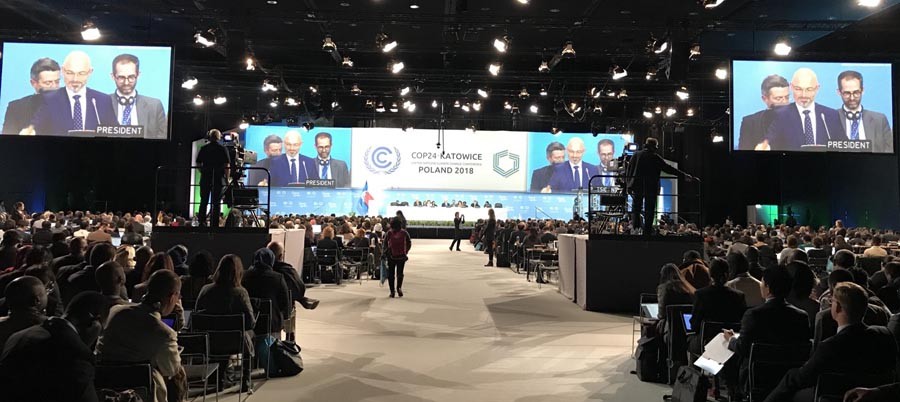
While the world looked up to its leaders to present a united front against the uptick in natural calamities, the COP24 turned simply into a showboating event

As parties to the last year’s 24th conference of the parties (COP24) of the United Nations Climate Change Convention (UNFCCC), held at Katowice, Poland, wrapped up two weeks of negotiations, the halls of the Spodek Center echoed with the voices of environmental activists, indigenous groups and vulnerable communities from around the world, who demanded that negotiators deliver on the promises made three years ago in the Paris Agreement.
The mandate was daunting for this year’s COP24. Representatives from around the world were expected to put their heads together to produce a "rulebook" to flesh out the detail of the Paris Agreement, such as how the ratchet mechanism will work for ramping up ambition on emissions reductions.
Unfortunately, at the COP24, leaders made no progress in advancing a global agenda for keeping the global temperature below 1.5 degrees with the final communiqué being a sad laundry list with little conviction on any point and a failure to deliver a clear commitment to strengthen all countries’ climate pledges by 2020.
Similarly, environmental activists and journalists are not pleased with the relatively effective but incomplete "rulebook" which is to guide countries and economies to implement the Paris Agreement of 2015. With limited progress made with regard to how financial support for poorer/developing countries coping with devastating impacts of climate change will be provided and accounted for, the final outcome of the conference included hints at the need for more ambitious climate pledges before 2020, which left many environmental organisations disappointed at the lack of more forceful language.
This strain over climate change action was carried into the COP24 from the Group of 20 (G20) summit in Argentina where differences among the top 20 economies of the world laid bare only a day before the Climate Conference was to begin. With the United States adamant in pulling out of the Paris Agreement, the final communiqué of G20 failed to give a full-throated support to actions against climate change.
Argentina’s Sherpa for the G20 summit, Pedro Villagra Delgado, while drafting the final communiqué, was heard complaining the Paris Agreement text to be the "most complicated" part of the communiqué. He was also quoted to have said that "We must (also) bear in mind that, if there is no consensus here (G20), if there is an important rupture here will poison the COP24." And it did. The coalition in G20 against the United States on climate change showed signs of fraying, with several countries, including Turkey, Russia and Saudi Arabia balked at signing the document before finally backing it.
The climate conference at Katowice saw developments such as the Trump administration’s announcement of pulling out of the Paris Agreement and the fear of other countries following suit as a major setback to the agenda. And with an absence of clear leadership to steer the course of negotiations and the extreme technical nature of the negotiations, UN Secretary-General Antonio Guterres had to visit the COP several times to force progress and in a bid to reach "positive outcome" in face of division on a final document. This saw the COP24 running into overtime as delegates rushed to approve the Paris rulebook. Many observers termed the panic a "lack of political will" by delegates to come to a unanimous conclusion.
Throughout the two weeks’ discussion, it was given that the US being an obstructionist in the climate regime wanted re-negotiation of the Paris Agreement to suit its interests. At a time when dealing with the US as a collective front became crucial, the US successfully wooed fossil fuel loving countries like Russia, Saudi Arabia and Kuwait to its side. It pushed its stance taken at the G20 summit and tried to undermine justice and oppose equity and outcomes on finance. Collectively all three tried to undermine the gravity of the landmark Intergovernmental Panel on Climate Change (IPCC) science report which came out in October 2018 and was expected to become the foundation stone of COP24. Consequently, COP24 also failed to address the bioenergy carbon counting loophole (that originated in the Kyoto Protocol, and was carried forward in the Paris Agreement) which incentivises the harvesting and burning of trees to make energy by calling the process carbon neutral.
Despite settling on large parts of the Paris rulebook, countries failed to agree the rules for voluntary market mechanisms, pushing part of the process onto next year’s COP25 in Chile. It is clear that governments at the climate conference have failed to adequately respond to the catastrophic impacts of climate change that were highlighted in the IPCC report on keeping the global temperatures to below 1.5°C. Climate activists believe that not only have countries largely failed to adopt the IPCC report recommendations in Katowice, but the COP itself has cast a long shadow on the role and value of stakeholder engagement in UN climate processes.
The only positive takeaways from this year’s climate conference were the real commitments by sub-nationals to reduce emissions, invest in innovative technologies and promote sustainable practices in emissions-heavy industries like agriculture, and the presence of young activists who were loud, persistent and unsparing in the demands they placed on their leaders.
In hindsight, the lack of accomplishment in Katowice reflects a broader trend; governments - individually and collectively - are increasingly unable to respond effectively to many of today’s urgent environmental issues. The world needs durable, sustainable, inclusive growth. It needs solutions on climate change. It needs infrastructure. But governments alone aren’t getting it done. It’s time for others to step up -- not out of noble impulse, but because it’s in our collective interests.
While the world looked up to its leaders to present a united front against the uptick in natural calamities in the wake of climate change, the COP24 turned simply into a showboating event.